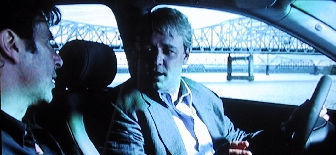Fcourt
Lawrence Russell
The Insider (1999) dir. Michael Mann writ. Eric Roth & M. Mann cine. Dante Spinotti edt. William Goldenberg & Paul Rubell music Lisa Gerrard & Peter Bourke star. Russell Crowe (Jeffrey Wigand), Al Pacino (Lowell Bergman), Christopher Plummer (Mike Wallace), Philip Baker Hall (Don Hewitt), Diane Venora, Lindsay Crouse, Debbie Mazar, Rip Torn et. al.
Touchstone Pictures
New Age Nicotine
A Michael Mann film always looks good -- even if the action isn't cutting it, the art on the walls looks good. The Insider is no exception, elevating mundane interiors with exotic background window views or simple sit and talk scenes with stellar lighting and captured natural optics. Wigand (Crowe) and Lowell (Pacino) sit talking inside a silver Audi parked on the raw green grass beside an estuary, a strange band of green light from the windshield tinting binding them a like a design diagonal on a cigarette box... or Lowell walks a windswept beach strewn with kelp somewhere in the Keys talking into his cell, the sky leaden, the ocean churning turquoise and silver. Everything looks so good you forget you've been bored for the first hour.

If this photo essay on the villainy of the big tobacco corporations didn't have a well-known story, you'd be baffled. The action starts somewhere in the Middle East with the CBS 60 Minutes crew interviewing some Hezbollah ayatollah at a secret location... the only cigarettes you see in the entire film are smoked by the volatile gunmen, a crude moral long forgotten by the ending. Other than establishing the characterizations of Lowell Bergman and Mike Wallace (Plummer), what is the point of all this? It has nothing to do with Dr. Jeffrey Wigand's struggle with the tobacco giants and his own conscience.
to burn or not to burn
The idea is, of course, to make the stories of the ex-tobacco scientist and the 60 Minutes producer parallel moral lessons which eventually integrate by the end... and in a way they do. But there's no doubt that Pacino's story eclipses Crowe's as you never really see what's on-the-line for his character as Wigand. The fact that he gets fired from his job doesn't carry the same moral momentum as someone reacting because he has been damaged by cigarettes. The evil is that nicotine kills and the tobacco peddlers know it. The evil is that dropped, smoldering cigarettes kill and the tobacco peddlers can do something about it and don't. But where do you see first hand the effects of smoking? Where do you see a sleeping victim of a smoldering cigarette?
Without question the decision to have no American characters smoke is deliberate... after all, you wouldn't want to alienate the one half of your audience who continue to smoke and enjoy it while encouraging the moral gloating of the other half who don't... or God forbid, pissing them off by apparently endorsing the forbidden pleasure.* But it's this coy political aesthetic that makes The Insider all talk and no action. As Wigand returns to Kentucky after breaking his confidentiality agreement, he sees a burning car in the darkness, presumably a traffic casualty... but without a burning Hamlet somewhere in the story to foreshadow it, the symbolism is nothing more than visual effect.
If anything succeeds it's the acting of Crowe and Pacino. Plummer is also effective as Mike Wallace, although his character is a bit facile due to the fact that Mann tries to soften Wallace's "apparent" professional cowardice by making him look good at the end. As for the females, what can you say? Wigand's suffering wife Leanne is a cliche, a domestic drudge in one dimension, included merely to show how tobacco CEOs destroy families as well.
The drama picks up with 60 Minutes' betrayal of Wigand... at least now you don't have to strain to hear the dialogue (perhaps the under-mic'd conversations are a DVD problem). Too bad about the sentimental post-broadcast coda, though. The music is irritating, a New Age holy holy schmaltz that makes the montages mere filler, add time to a film that's already far too long.
Dr. Jeffrey Wigand worked as a tobacco scientist (Brown & Williamson Lab) and certainly knew all about Project Hamlet ("to burn or not to burn")... and it would appear went through tremendous personal hardship in trying to make the cigarette manufacturers accountable for the damage their product has caused to the health of millions of people. It's an interesting story, it's an important story... and it played well as a documentary on 60 Minutes. At the time, the background media politics were also interesting... but not so interesting as to make a trio of famous American journalists into characters who matter. If you saw them smoking, well....
But what can you say here? That Mann was apparently in the same legal lock as the characters he pretends to dramatize? Mike Wallace... how could you really build a fictional character on this famous broadcast journalist when a) he's still alive and can sue, and b) fiction isn't your intent anyway? This film's nomination as Best Picture can only be viewed as politics, another hedge investment in moral superiority by the Academy.
*When Wigand is giving his Deposition in Mississippi, you see a cameraman ritualize a cigarette in the parking lot... but as his back is to the camera, who is to say what he put in his mouth?
© LR 4/2000